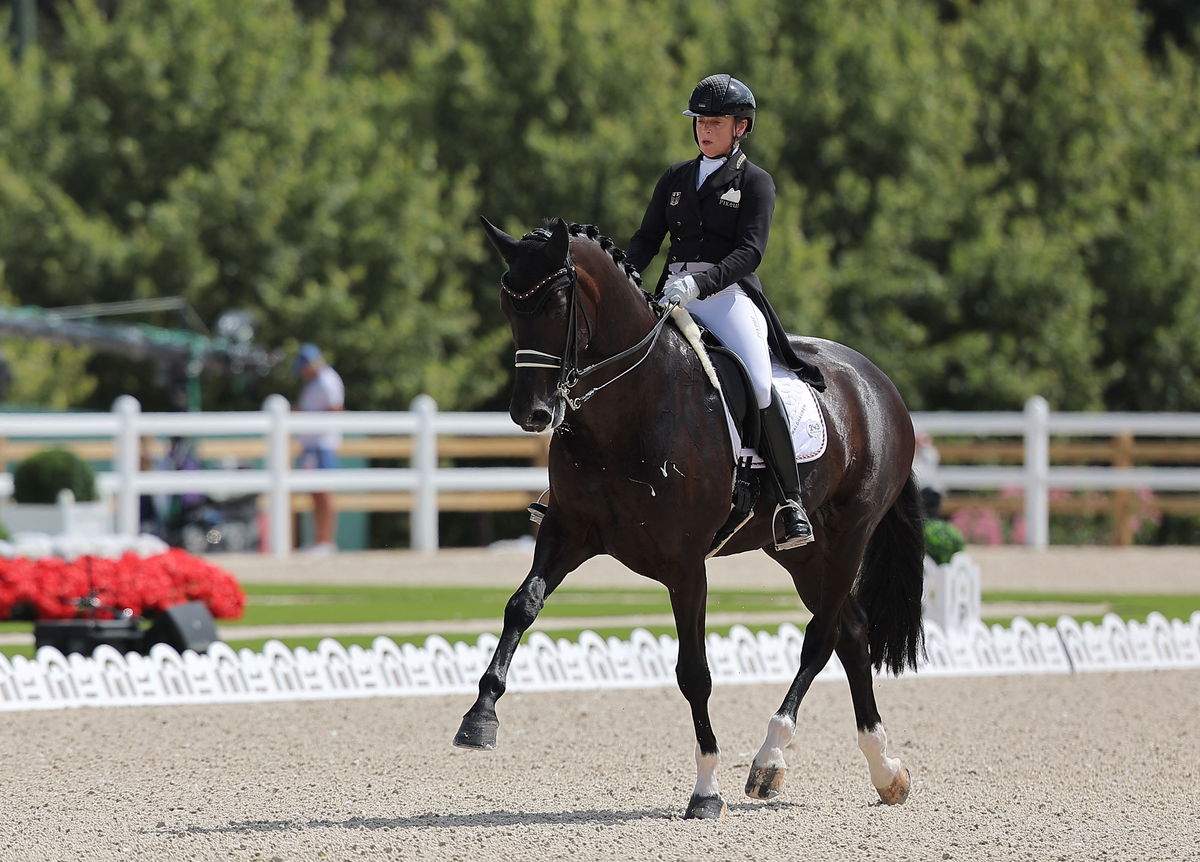
Reuters
Paris 2024 Olympics – Equestrian – Dressage Individual Grand Prix Freestyle – Chateau de Versailles, Versailles, France – August 04, 2024. Isabell Werth of Germany riding Wendy in action. REUTERS/Zohra Bensemra

Reuters
Paris 2024 Olympics – Equestrian – Dressage Individual Grand Prix Freestyle – Chateau de Versailles, Versailles, France – August 04, 2024. Isabell Werth of Germany riding Wendy in action. REUTERS/Zohra Bensemra
Sometimes, the pursuit of Olympic dreams is shadowed by controversy. This unexpected reality has dramatically unfolded in the world of equestrian sports, with German equestrian Isabell Werth at the center of a storm. Werth, a beacon of excellence whose stellar performance secured a gold medal for Germany in Dressage, now finds herself in the crosshairs of an enraged public. The very fans who once cheered her triumph now condemn her for what they perceive as cruel handling of her beloved horse, Wendy.
Watch What’s Trending Now!
Equestrian sports, always teetering on the edge of controversy, have this year plunged headlong into the abyss. Any sport involving animals navigates a perilous path, but this year, the line between passion and cruelty seems more blurred than ever. Accusations of mistreatment aren’t just whispers; they’re a resounding outcry, amplified by the ever-watchful eyes of social media.
The moment Werth’s dressage routine concluded, a flurry of indignation erupted online. A viral video, capturing Wendy’s peculiar, almost frantic movements, ignited a firestorm. Wendy, usually a picture of grace, appeared to dance in distress, a sight that pierced the hearts of animal lovers worldwide. The natural elegance of a horse’s gait was conspicuously absent, replaced by unsettling, erratic jumps. For many, this was not just a breach of sporting etiquette but a profound betrayal of trust and compassion.
ADVERTISEMENT
The outcry was swift and fierce. Animal rights advocates and equestrian enthusiasts alike raised their voices, painting Werth’s performance not as a testament to skill, but as a disturbing display of dominance. Each frame of Wendy’s discomfort was scrutinized, each second replayed in an anguished quest for justice. This wasn’t merely about a routine gone awry; it was about the very soul of the sport, about ensuring that the pursuit of glory does not come at the expense of those who cannot voice their pain.
In this heated atmosphere, the debate over animal welfare in sports has reached a fever pitch. The fervent cries for ethical treatment echo louder than the cheers of victory, reminding us all that true greatness is measured not just in medals, but in the humanity with which we treat our fellow beings, be they human or animal.
.
ADVERTISEMENT
This just won an #Olympic #Dressage #gold medal 🤢🤢🤢 Get #horses out of the #OlympicGames pic.twitter.com/3dP4G8joKV
— Epona.tv (@eponatv) August 3, 2024
Equestrian has been a part of this discussion for a long time. Earlier in July a video of British rider Charlotte Dujardin went viral. In the video, Dujardin was seen whipping the horse continuously during its training. As a result, Dujardin pulled out of Paris but it highlighted the core issue that the fans have with the sport. It is very easy to slip into the animal abuse territory during the training and that doesn’t sit right with any animal lover. That was the reason why after Werth’s performance, social media was filled with heavy criticism.
ADVERTISEMENT
Isabell Werth becomes a target of the anti-equestrian crowd
Isabell Werth’s performance shocked multiple sports fans. They couldn’t understand why the Olympics still used animals. “How is it even a sport? I watched three minutes of it and felt disgust. Those poor horses,” said a fan. That is a common sentiment among animal lovers regarding usage of animals in the Olympics. But more importantly, they cannot fathom why the animals are made to do seemingly unnatural things to satisfy the human desire for competition and recognition.
“Get animals out of the humans urge to compete. Ambition and money clouds our personal judgement,” wrote another fan. Movements to end animal-related sports in the Olympics have been raging on for years. However, despite the federations promising to eliminate animal abuse, the fire for a change hasn’t been put out yet. As a result, with each Olympics, calls for elimination only get louder.
ADVERTISEMENT
“I hope for the cruelty of dancing horse to be outlawed as were dancing bears a long time ago,” said an animal lover. During ancient times dancing bears or tame bears were one of the most common forms of entertainment. That continued till the 19th to 20th century but the practice lost its prevalence due to decades of activism. Now the practice exists no more, except in a few nations. Fans are hoping something similar happens with horse dancing too.
Top Stories
DK Metcalf Awaits Huge Punishment From NFL After Controversial Incident vs Detroit Lions

Dak Prescott Publicly Accuses Cowboys Locker Room of Giving Up After Jerry Jones’ 1-Word Reaction

LIV Golf Issues Statement as Pro Announces Shock Retirement After Getting Relegated

Chiefs’ Chris Oladokun Reveals Patrick Mahomes’ Gesture After Titans Game Amid Gardner Minshew’s Injury

Jared Goff Calls Out Refs’ Multiple Mistakes After Lions’ Loss

Andy Reid Announces if Chiefs Will Sign New QB After Gardner Minshew’s ACL Injury

“Wtf…. animal abuse gets a medal…” wrote an X user. That is the crux of the issue here. Most animal lovers think that the Olympics isn’t just allowing this abuse but also rewarding it. In their eyes, this constant showcase has made this thing more mainstream. That is counterproductive to their mission of turning it extinct. As a result, Werth’s performance has become a hot topic of discussion for them.
“That horse dances pretty good! Great performance!” said an equestrian lover. This is the different side of this story. While many oppose this practice, there are just as many people who adore this sport. That is why despite some heavy criticism, equestrian continues to find a place within the Olympic schedule.
ADVERTISEMENT
So it looks like despite winning a gold Isabell Werth wasn’t bulletproof to criticism. But how much was it for her and how much was it for the sport itself? That is certainly a big question.
ADVERTISEMENT
ADVERTISEMENT
ADVERTISEMENT

